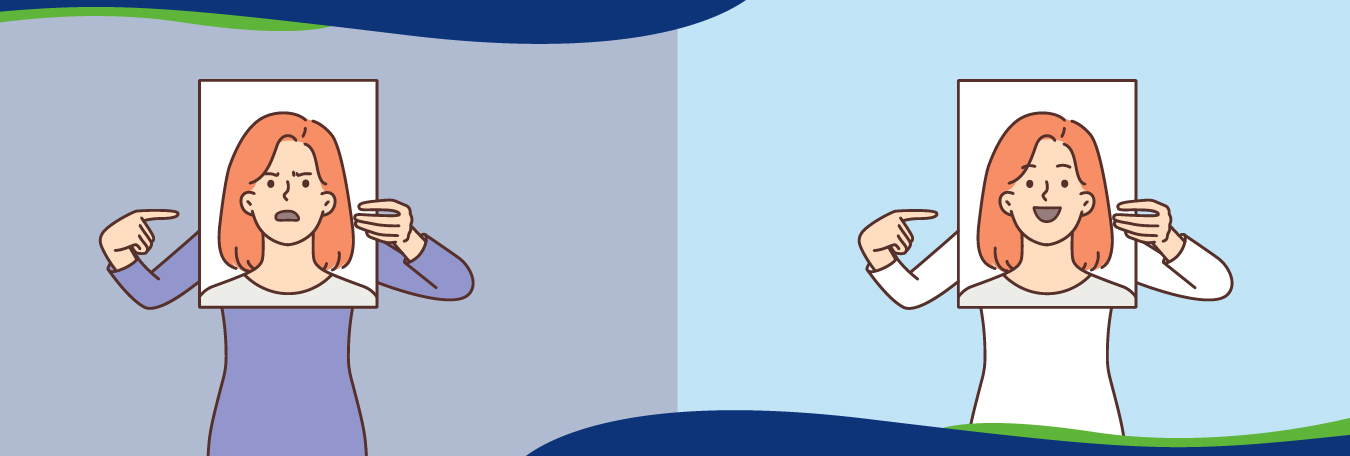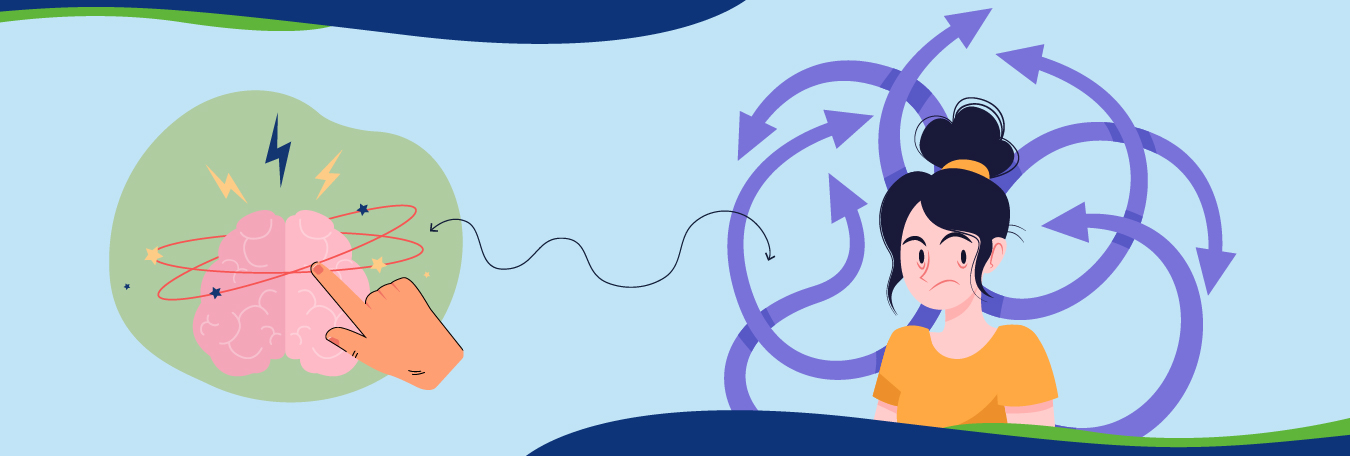Have you ever felt like you are sitting alone, watching television? You suddenly feel an overwhelming fear, although there is no danger around you. You felt dark around you, as walls were crossing over you. The feeling came nowhere, and it was horrific.
Worse, you felt like reality was breaking apart. You had no idea what was happening around you. For a moment, you felt like you were going crazy or insane.
The feeling went away after a few moments, and you felt calm but still felt nervous. The panic attack had passed. But even after, you didn’t feel quite right, and felt fuzzy, and quite at sea. (a feeling commonly noticed in panic attacks).
You felt like everything would be fine after a sleep, and in the morning.
But except for that, it was not….
This is called depersonalization/derealization disorder (DP/DR|).
In this blog, you will learn about the root causes of depersonalization, chronic mental health conditions that drive your mind to forget about your surroundings and yourself. And the best treatments for this condition. So stay tuned!
What Is Depersonalization And Derealization Disorder?
Depersonalization and derealization disorder can be a strange and scary mental health condition where a person feels disconnected from reality and their surroundings.
This is a feeling that the world around you is unreal, foggy, or dreamlike. You begin questioning the very nature of your existence or feel disconnected from your surroundings, you might be experiencing derealization (DR). This is a mental health condition that is complex but is well understood and fully treatable.
Get to Know More About:
As part of the continuum of dissociative disorders, DR often happens alongside depersonalization (DP), a feeling of being detached from your own body or thoughts, like you are watching yourself in a movie.
At Inland Empire Behavioral Group, we know this is a real experience, and we are here to help you find your way back to reality.
What are the root causes of Derealization?
Why does your brain suddenly hit the disconnect switch?
There are several reasons and causes of derealization, including psychiatric disorder, neurological disorder, or stress. You can also associate it with fatigue.

Conditions associated with derealization include:
- Depression
- Anxiety
- Panic disorder
- Post-traumatic stress disorder
- Migraine
- Epilepsy
- Use of drugs
- Inner ear disorder
- Fatique
- Borderline personality disorder
- derealization anxiety disorder
Knowing the root cause and symptoms of derealization and depersonalization would be the first step towards recovery.
Emotional Causes of Derealization
The human body is like a delicate internal system. Chronic stress acts like an unending surge that throws everything off balance. When you are under severe, long-term stress, like facing a difficult relationship, the loss of a loved one, or even a major life change like a pandemic lockdown, your body floods with stress hormones like cortisol and adrenaline.
This sustained chemical imbalance can disrupt your normal brain functions and lead you to feel as if you are watching yourself in a movie from outside a glass wall. Your brain is trying to find a quieter, safer place to be, even if it means leaving “reality” behind for a while to give you an escape from your present situation.
Do You Know: What Is Emotion-Focused Coping?
Trauma and Emotional Overload
A powerful cause of derealization is psychological trauma. This refers to deep emotional or mental damage that happened after a severely distressing or life-threatening event. Whether such events happen in childhood, like abuse or emotional neglect, or trauma occurs in adulthood, like accidents, violence, or combat, the mind’s primary goal is survival.
In a state of extreme danger or distress, the mind and body may dissociate as a survival tactic. It is a brilliant, though temporary, way to keep functioning when faced with a breakdown.
By cutting you from overwhelming negative emotions, the mind prevents you from becoming completely paralyzed. The side effect, however, is a widespread emotional numbness, where positive feelings like joy and love also fade, and the world begins to appear strange and unreal.
Neurological and Physical Causes of Derealization
Sometimes, feeling like the world isn’t real (derealization) happens for more reasons than just feeling stressed or having a scary experience.
The sense of reality is intimately linked to how your brain processes information. It takes in information like what you see and hear, and it figures out what is real.
Your brain tells you what’s real by combining signals from your senses (eyes, ears, etc.).
Derealization can happen when a person has a change in their brain activity right before a seizure. Something is wrong with your inner ear (which helps you keep your balance), which is why people sometimes feel dizzy or have unsteadiness.
These physical changes prove that they aren’t just a mood or imagination. There can be real physical changes in how your brain works that cause that feeling.
This shows how closely the brain and body are connected.

What Are The Conditions And Feelings of Derealization?
Although every person’s experience is different and depends on personal experiences, those who go through derealization symptoms often share a few common, core sensations. These could be:
- Your surroundings feel wrong if these are unfamiliar ones. The environment looks strangely flat, distorted, or blurry. Familiar places can suddenly feel unfamiliar, as if you are visiting them for the first time.
- The world feels dreamlike. Real life feels unreal, or like you are the scene in a movie or dream that is not real.
- Time does not feel right. It loses its flow. Time feels like moving too fast, too slow, and the present moments can feel off. The present is not like the present.
- Emotions feel flat. You might not feel true happiness, sadness, or affection with anyone, even when you expect to.
- Existential overdrive. Your mind might keep asking scary questions like “Am I going crazy?” or Is reality real?” or any other weird questions. These questions become the hallmark of this condition.
- Strange physical feelings. People often feel stuff like heavy chest pain, pressure on the head, feeling lightheaded, or arms or legs that feel strange.
- Mental silence or loud sounds. Your inner mental world can also change. Some people experience a blank mind with no thoughts, while others can’t stop worrying.
Learn About More Information on: The Psychology of Escapism: Coping Skill or Disastrous Action
If these experiences happen to you, they can be scary, but you can’t fight them back on your own. It will help if you talk with a healthcare professional who can check what might be causing them and suggest ways to feel more safer.
How to Return to Feeling Real Again: Effective Treatment Options for Derealization
The treatment of derealization and depersonalization is necessary because it can cause stress and disrupt the normal functioning of life. Sometimes, derealization treatment can be a part of comprehensive management of conditions like anxiety, PTSD, or other physical conditions like inner ear disorder.
The most important thing to know is that you can fully recover from personalization/derealization disorder. This condition is not a permanent state; this is a temporary response from an overwhelming system.
At Inland Empire Behavioral Group, our approach focuses on moving past fear and gently guiding your mind back to normal. By addressing the root causes, whether it is chronic stress, past trauma, or both, we help your brain turn off the defensive mechanism that has created the derealization in the first place. You don’t have to wonder if this planet feels like a lost soul. We offer experienced, compassionate support to help you feel relax, and completely in real time again. If you want to move from just watching life to actively living it, we are here to support you.
Here are the possible treatment options that we use to overcome derealization and depersonalization disorders.
1. Finding The Roots Of Disconnection
When derealization occurs as a response to several traumas or ongoing abuse, the therapy focus must shift to gaining more effective ways to manage that underlying trauma. Sometimes the first step is just helping you to distance yourself from those harmful situations or feelings. The goal is to address all the stresses, both recent and early life experiences like childhood neglect, that may have made you vulnerable to dissociation.
2. Psychotherapy for Derealization
Therapy is the core of derealization treatment. It provides a safe space to find and resolve the intense pressure that causes your mind to disassociate. Our treatment uses many different approaches and effective techniques that are tailored to your unique needs.
Specific Therapeutic Techniques That Work
We use proven therapeutic methods to gently rewire your thinking and behavior.
✅ Cognitive techniques
This therapy can help you interpret and block the obsessive loop of thinking that fixates on “Is this real?” It can help you understand how your thoughts affect your actions and how to forget negative, intrusive thought patterns. You can learn to trust your perceptions again.
✅ Behavioral technique
We help you engage in tasks that effectively distract your mind from the unsettling feeling. This redirects the mental energy away from the feelings of unreality and toward constructive, present-focused activity.
✅ Psychodynamic Techniques
This approach explores your past experiences, negative feelings, internal conflicts, and how they have captured your mind today. It helps you safely process those feelings and emotions that may have been too painful to bear in the past and practice your mind to let them “dissociate” from thoughts.
How We Treat Derealization With Focused And Comprehensive Care
At Inland Empire Behavioral Group, we view decentralization and realization not as a disorder, but as a protective mechanism that your mind uses to cope with overwhelming stress or underlying issues. Therefore, our stressful treatment always involves a comprehensive approach that addresses the root causes of the disorder, and not the symptom itself.
We provide professional, evidence-based mental health services that are tailored to help you overcome derealization and any associated mental conditions. Our team offers a compassionate, understanding environment where you can safely address the root causes of your disconnection from reality. We are committed to helping you integrate your experiences and find stable, lasting peace.
Call us today to schedule a confidential assessment. Let us help you feel reality, present, and fully in control of your life again.





